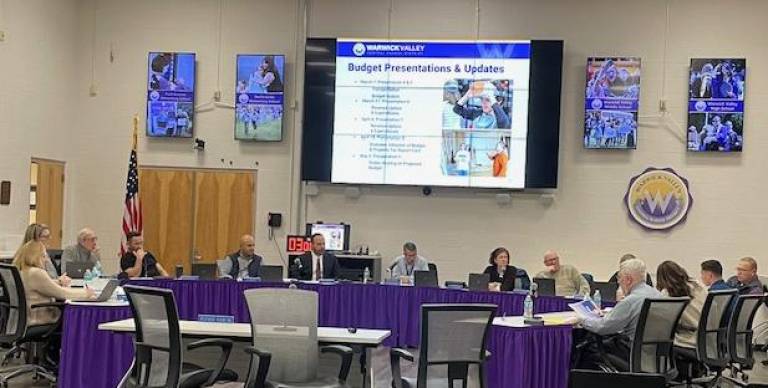Warwick BOE talks budgets, buses, & BOCES
Warwick. Convergent offers post-mortem report, apologizes to district over last year’s battery fires.

As another school budget season heats up, members of OU-BOCES presented their proposed administrative budget for the upcoming school year, at the Warwick Valley Central School District’s regular monthly board meeting on March 7.
Chief Operating Officer Deborah McBride Heppes, Assistant Superintendent of Finance and Management Services Mark P. Coleman, and Cooperative Board President Jean Pavek addressed the WV school board.
The BOCES budget comprises three parts: administrative, rental, and capital.
A multi-year capital budget approved by the voters has begun, and will provide “infrastructure improvements, enhancements and new space to provide exceptional educational experiences for our students,” according to a BOCES statement. The coming year’s capital budget of $8,353,513 will be financed through the Dormitory Authority of the State of New York.
The total proposed administrative budget for BOCES is $8,261,477 — an increase of nearly 4% over the current year, driven mainly by rising costs of staff benefits and pensions. The WV BOE will be voting on this part of the BOCES budget on April 18.
Buses
As it does each year, the school district is looking to get voters’ approval to replace some of its aging fleet. Currently, WV has a fleet of 46 65-passenger buses with eight spare buses, four 60-passenger buses with one spare, seven 20-30-passenger buses with one spare, four wheelchair-accessible buses with two spares, and zero nine-passenger Suburbans with three spares for a total of 61 vehicles in regular rotation, plus 15 spares.
Twenty-eight of these buses are diesel, 26 buses are gasoline-powered, and rounding out the fleet are 22 propane-powered buses.
Fifteen of the buses are 15 years old or more. Generally, buses between 10 and 12 years old begin to have engine problems and body rust, according to transportation supervisor Laura Schneider. Twenty-one of those buses have over 150,000 miles on them, and 13 buses have 100,000 to 149,000 miles.
The annual cost of maintaining buses over 10 years old is $38,280; buses under 10 years cost $32,640 to maintain on average. The total cost to maintain the current fleet is $2,627,280.
School budget at a glance
The tax levy for the 2023-24 school year is $66,580,963; an increase of $2,555,086.
The maximum tax levy for 2024-25 is $69,136,049, a 3.84% increase.
According to school superintendent Dr. David Leach, these are driving the increase: Inflation, a decrease in building aid from Albany (by $155,282), an increase in the district’s debt service of $375,080, an increase in BOCES’ debt service of $102,744, and an ERS pension exclusion of $10,780.
The school board expects to offset the increase in pension and benefit costs by using some of its reserves.
Projected revenue
The projected revenue from non-tax sources for 2024-25 is $4,583,934 — a difference of $357,659 over the current year.
Aid from Albany is projected to be $38,672,886, an increase of $2,774,945. The library bond levy is expected to be $430,350, a difference of $3,500. The school tax is projected to be $68,474,288, an increase of $2,320,175. The appropriated fund balance increases by $365,000, to $3,000,000.
Leach reminded those present that state aid accounts for 30% of the budget.
Electric battery fire follow-up
Representatives from Convergent Energy, Powin, and O&R Utilities addressed the board in the aftermath of last summer’s fire at the Convergent Energy lithium ion battery storage center on County Route 1.
Convergent co-founder and CEO Frank Genova, Powin Chief Project Officer Brian Kane, and Vincent Galligan of O&R provided the results of a “root cause analysis” (originally presented last fall to the board).
According to Kane, parts that weren’t supposed to get wet, got wet, causing arcing.
“The root cause,” Kane added, “was not a product of the batteries,” but “a manufacturing defect that permitted water intrusion.”
Further, Kane said all original battery packs were to be replaced, and a special sealant will be added to the batteries’ enclosures, to prevent water from intruding in the future. Powin is doing enhanced manufacturing, testing the batteries 200 times a week on average.
Additionally, a fire barrier will be installed to prevent potential fires from spreading between battery units. The tests will be reviewed by an independent third party.
Kane added, “Five thousand of these units are already in the field ... We want to reassure [the community] that safety remains our number one priority.”
He also noted that “built-in redundancies” should minimize those risks.
Genova said that Convergent is monitoring Warwick’s systems remotely and is training the fire department how to deal with lithium-ion batteries safely. He emphasized that any costs associated with this testing will not be borne by the taxpayers, but by Convergent, O&R, and Powin.
Other business
On April 4, another budget presentation will take place, with a revenue update and expenditures, at the Dorothy C. Wilson Education Center at 7 p.m.
On April 18 the board will finalize the budget in preparation for its May 9 public hearing. Then on May 21, district residents will have the opportunity to vote on the budget, as well as candidates for three seats on the Board of Education. This June the terms of board members Sharon Davis, William Fanos and Lynn Lillian are set to expire. Prospective candidates have until April 22 to turn in their nominating petitions to fill those seats.